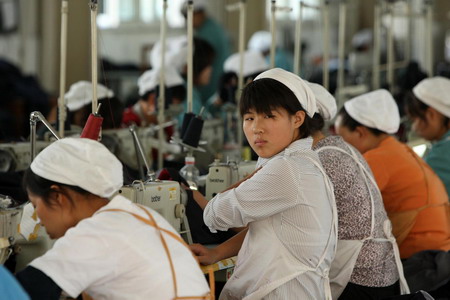Economy
China's trade surplus likely to shrink
By Li Xiang and Ding Qingfen (China Daily)
Updated: 2010-08-18 09:51
 |
Large Medium Small |
BEIJING - The Ministry of Commerce on Tuesday said China's trade surplus is expected to shrink gradually in the next few months, as the government will adopt more stimulus measures to boost imports.
|
 |
|
Workers at an apparel factory in Huaibei, Anhui province. China's trade surplus could be trimmed as the nation is planning stimulus measures to boost imports. [China Daily] |
"Given that growth in exports outpaces that of imports, as shown by the July trade figures, the Chinese government is planning to adopt measures during the rest of the year to boost demand for imports and balance foreign trade," ministry spokesperson Yao Jian said at a press briefing.
Though Yao did not specify any details on the government moves, he said the trade surplus would continue to narrow as the measures take effect and household incomes increase.
| ||||
The slower growth in imports is the latest sign that China's curbs on the real estate sector are impacting demand and many economists said the trade surplus will remain high as import growth continues to decelerate.
Yao, however, remains optimistic and said, "I don't think that will be true."
China's export growth has fallen in the three months since May, and the ministry has said the growth rate will decelerate for the rest of the year.
Li Jian, a researcher at the Academy of International Trade and Economic Cooperation under the commerce ministry, said "government policies to reduce tax rebates on energy-intensive exports in June and the recent policy on remitting import value-added tax and import tax on some high-tech products will help narrow China's trade surplus in the short term".
The commerce ministry will hold the China 2010 Import Forum in September this year to stimulate imports.
China has also launched a series of import-oriented policies, including the reduction of overall tariffs to 9.8 percent and further reductions for raw materials, zero-tariff treatment for the-least-developed countries, and more facilities for imports.
Analysts said the measures to stimulate imports will help ease pressure on the high trade surplus in the short term, but cannot be perceived as a long-term strategy.
"The high trade surplus has been coming from the processing trade of foreign enterprises as a result of the export-oriented economic development mode", said Song Hong, an economist with the international trade department under the Chinese Academy of Social Sciences.
Song said, "in the long run the high trade surplus would gradually narrow when the household incomes increase and the Chinese economy becomes more consumer-driven."
Analysts said that the monthly trade surplus would remain high at above $20 billion for the rest of the year despite the stimulus measures.
The import growth may continue to slow as the economy shows signs of cooling and the government's ongoing real estate tightening will continue to curb imports of raw materials and equipment, they said.



